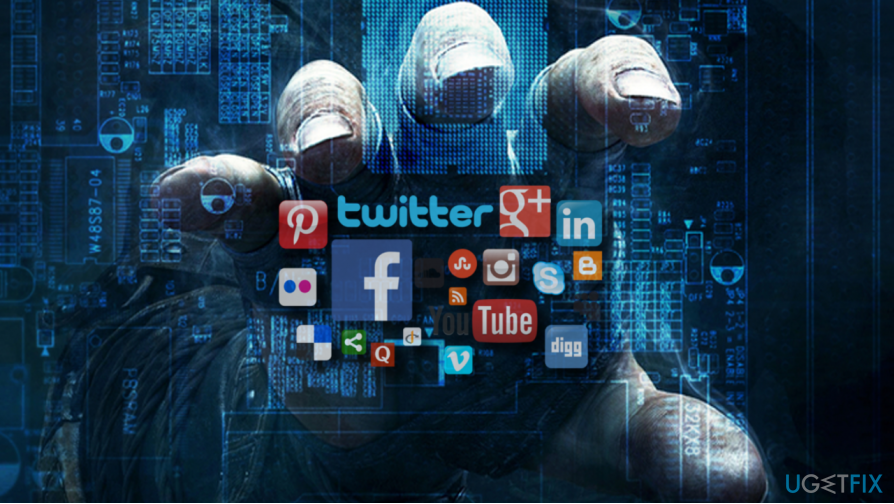
Cyber intrusions have always been one of the dominated issues in the cyber community. While a decade ago computer users were confronting Trojans, Rogue Antispyware, and Ransomware attacks in most of the cases, nowadays cyber criminals are changing their techniques and targeting social media accounts.
The rapid growth of technologies gradually pushed people into world social media. In 2016, the University of Phoenix has initiated a research[1] on social network usage by adults and found out that 84 percent of US adults are using at least one social media account.
While the number varies on different countries, the fact is that people are strongly inclined to social networking and the number of users has multiplied through the comparatively short time, inviting hackers to change the targets and switch to cyber attacks on social networks.
The problem is that people don’t understand the risks they take while using social networks. Most people understand social media[2] as a mean for communication with friends and family. The business people use social networks for increasing marketing and opportunities to improve interactions with customers. Often people not only forget to evaluate what information is safe to share on social networks and don’t worry about the simplest precautionary measures against hacking and other attacks.
It doesn’t matter if you are using Facebook, Twitter, Instagram, Snapchat, etc. or all, you should beware of the methods on how to secure your account.
INTERESTING: Two scientists, Manlio De Domenico, and Alex Arenas, from the Department of Computer Engineering and Mathematics of the University Rovira in Virgili (URV), investigated the cyber attacks against darknet[3] sites.
Tips on How to Keep Your Social Network Account Safe
Although dart net is usually associated with illegal activities, many people from countries like South Korea can only connect to social networks via darknet using Tor browser. According to the scientists, the websites on the darknet are much harder to attack and hackers try to steal information on darknet despite the fact of staying undetected.
Those who mind their security on social networks should be aware of the following tips on how to secure your social media account.
#1. Create a strong social account password
It was noticed that people keep using primitive account passwords like 123456. Such passwords can easily be hacked, especially if they are used for multiple accounts by one user.
Even though it’s difficult to find a password that would be complex enough, but easy-to-remember at the same time, it’s crucial to use a strong password to prevent attacks. Beware that hackers can easily find your birth date, address, surname, and other personal information on your social network (unless you don’t include it) and try it for guessing the password.
A strong password should consist of numbers, letters (lower case and capital), and punctuation. This way, it will be difficult to guess.
IMPORTANT: do not use the same password on all social media and other accounts.
#2. Change your social media account password regularly
Even a strong password can be hacked if it’s used on many social media accounts for a long time. Thus, to keep your personal information safe, change the password regularly (every three months or so).
If it’s too difficult for you to remember passwords, try using a password manager.
#3. Enable two-factor authentication
Two-Factor Authentication is a security feature supported by most of the major social networks, including Facebook, Twitter, Google+, Youtube, and others. The feature requires to enter a special security code, which can be received either on a mobile device or email address paired with your network account.
For more information about Two-Factor Authentication and how to enable it on Facebook, refer to this post.
#4. Regularly check email paired with your social account
Facebook and other most popular social media platforms block suspicious logins, for example, when trying to login to the account from a different device.
In this case, social network automatically sends an email to the account holder reporting the suspicious login and (often) indicating a device on which the supposedly suspicious login has been attempted. If you received such a warning, immediately change your password unless it’s you who were trying to login to your account.
#5. Do not click on suspicious links
Even if you receive a message on social media from a friend or relative, which contains a suspicious link, please DO NOT click on it. You may get infected with the Facebook scam,[4] which may further lead to account hacking.
#6. Don’t open suspicious content
Cybercriminals exploit social media content, such as news, articles or prize giveaways for spreading malicious files, such as keyloggers or spyware. Therefore, if you find a suspicious post on your social media account, instead of opening it, block it.
#7. Don’t enter your social media account passwords on suspicious verification windows
Another technique used by hackers is known as login verification phishing messages. When browsing on the Internet, the account owner may get a strange pop-up window from an unknown URL address asking to verify the credentials of the account.
DO NOT enter your login information on such pop-up windows because all information may be stolen.
#8. Be careful with the information you post
Posting personal information, such as address, telephone number, full name, etc. poses a risk to your security. Therefore, you should either refrain from sharing personal information or change privacy settings so that only close friends and family could access it.
#9. Don’t accept all friends’ requests
If you don’t know a person who wants to “friend” you, double check if it’s worth connecting with him/her. If you don’t have friends in common, keep in mind a possibility that he/she may be a hacker trying to get access to your account.
#10. Do not use auto-login and log out of social media account all the time
Due to the sake of security, it’s not advisable to save passwords to social media accounts on any devices. This way, you provide easy access to your social media account if the device is held by a third-party person. Therefore, log in each time by entering your password and log out right after you end the session.
Finally, don’t forget to install a professional anti-malware utility and install its updates regularly. It's advisable to run the tool with real-time protection.
- ^ George Beall. How hackers are using social media to hack. TNW. Inventing and advancing tech developments..
- ^ Priit Kallas. Top 15 Most Popular Social Networking Sites and Apps. Dreamgrow. Your Source of Content Marketing & Social Media Information.
- ^ Paul Bischoff. Guide: How to access the deep web and darknet. Comparitech. Helps people to decide about VPNs, antivirus and security products, cloud backup, password managers and more. .
- ^ Julie Splinters. It is time for another Facebook scam: Jayden K Smith is after you!. 2Spyware. A project dedicated to helping people learn more about computers and their protection..



